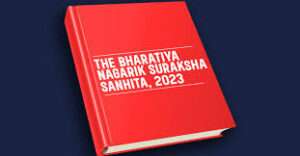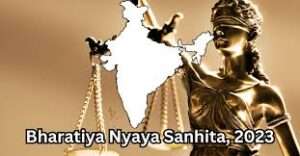
This article has been written by T Aditya Kamal pursuing 3rd year BBA LLB at KLE Law College, Bengaluru.

Introduction
The Bharatiya Nyaya Sanhita (BNS), enacted in 2023, is a significant legal reform aimed at replacing the Indian Penal Code (IPC), which has been in effect since British rule in India. This new legislation proposes several modifications to the current criminal laws in the country. The BNS is part of the government’s efforts to completely overhaul the country’s criminal justice system. It represents a modern understanding of crime and justice, adapting to the evolving societal and technological landscape. In BNS, we get to see the inclusion of some new Offences like:
- Mob Lynching: The BNS codifies offences related to mob lynching and hate-crime murders. It applies when a mob of five or more individuals commits murder based on factors such as race, caste, community, language, place of birth, or personal belief. The punishment ranges from life imprisonment to death.
- Organized Crime: For the first time, tackling organized crime is brought under ordinary criminal law. This aligns with special state legislations for organized crime syndicates.
- Terrorism: The BNS includes provisions related to terrorism within the ambit of ordinary criminal law.
- Attempt to Suicide: The BNS criminalizes attempting suicide with the intent to compel or restrain any public servant from discharging official duties. This provision could be invoked to prevent self-immolations and hunger strikes during protests.
- Promise to Marry: The BNS introduces a clause criminalizing “deceitful” promises to marry, including false promises related to employment, promotion, or marriage after suppressing identity.
Deletions which were made in BNS from IPC are as follows:
- Unnatural Sexual Offences: Section 377, which criminalized homosexuality and other “unnatural” sexual activities, has been repealed under the BNS.
- Adultery: The offence of adultery, previously struck down by the Supreme Court as unconstitutional in 2018, has been omitted.
- Thugs: The BNS fully omits the provision that labelled certain individuals as “thugs” based on colonial notions of criminality.
Howdy, you all! Welcome to your page of knowledge. You will find different legal blogs, the latest news, current affairs, and many more on this channel. This is the initiative to develop the knowledge of the law in the world, especially for you.
Analysis of Chapter IX of BNS
Chapter IX of BNS spans for a total of 9 sections i.e., from Section 167 to 175 of the said Act.
Section 167:
This section can be considered as a definition clause, as it has defined who is a candidate [167(a)] and what is an electoral right [167(b)]. Candidate is defined as a person who has been nominated as a candidate at any election and Electoral right means the right of a person to stand, or not to stand as, or to withdraw from being, a candidate or to vote or refrain from voting at an election.
Section 168:
This section deals with offenses related to bribery and electoral rights. The key points of this section are as follows:
- Offense of Bribery:
- Act: Giving a gratification to any person with the intention of inducing them or someone else to exercise an electoral right or rewarding them for having exercised such a right.
- Punishment: Imprisonment (up to three months), a fine (up to two thousand rupees), or both.
- Exception: Declarations of public policy or promises of public action are not offenses under this section.
- Definitions:
- Gratification: Any reward, benefit, or inducement.
- Offering Gratification: Offering, agreeing to give, or attempting to procure a gratification.
- Accepting Gratification: Obtaining, agreeing to accept, or attempting to obtain a gratification.
- Deemed Acceptance: If a person accepts a gratification as a motive for doing something they don’t intend to do or as a reward for something they haven’t done, it’s considered acceptance.
Section 168 aims to prevent bribery in the context of electoral rights. It penalizes both givers and recipients of gratification, emphasizing transparency and integrity in the electoral process.
Section 169:
This section deals with the undue influence at elections, the analysis for this section is as follows:
- Undue Influence:
- Act: Voluntarily interfering or attempting to interfere with the free exercise of any electoral right.
- Examples:
- Threatening a candidate, voter, or someone related to them with harm.
- Inducing a candidate or voter to believe that they will incur Divine displeasure or spiritual censure.
- Exception: Declarations of public policy, promises of public action, or exercising a legal right without intent to interfere with an electoral right are not considered undue influence.
Section 169 aims to maintain the integrity of elections by penalizing actions that manipulate or coerce voters.
Section 170:
This section deals with the offense of personation at an election. The contents of this section are as follows:
- Personation at an Election:
- Act: Committing any of the following actions during an election:
- Applying for a voting paper in the name of any other person (living or dead) or in a fictitious name.
- Applying for a voting paper in one’s own name after having already voted once in the same election.
- Abetting, procuring, or attempting to procure voting by any person using such fraudulent methods.
- Offense: Personation at an election.
- Exception: This section does not apply to a person authorized to vote as a proxy for an elector under existing laws, as long as they vote as a proxy for that elector.
- Act: Committing any of the following actions during an election:
Section 170 aims to prevent fraudulent voting practices and maintain the integrity of elections.
Section 171:
This section describes the punishment for committing the offence of bribery. And the main contents flow as follows:
- Prevention of Corruption Act, 1988 (PCA):
- The PCA is the primary anti-corruption statute in India.
- It criminalizes both the receipt of any “undue advantage” by “public servants” and the provision of such undue advantage by other individuals.
- The term “undue advantage” encompasses gratification, which is not limited to pecuniary benefits alone.
- Punishment for Bribery:
- If someone commits bribery, they can face the following penalties:
- Imprisonment: Up to one year.
- Fine: An amount determined by the court.
- If someone commits bribery, they can face the following penalties:
However, bribery by treating (where the gratification consists of food, drink, entertainment, or provision) is punishable by fine only. The law aims to curb corrupt practices and maintain integrity in public service.
Section 172:
This section deals with punishment for undue influence or personation at an election. The explanation is as follows:
- Undue Influence:
- Definition: Undue influence occurs when someone exerts pressure or manipulates voters to influence their voting decisions during an election.
- Punishment:
- Imprisonment: Up to one year.
- Fine: As determined by the court.
- Personation:
- Definition: Personation involves impersonating another voter or casting a vote on behalf of someone else.
- Punishment:
- Imprisonment: Up to one year.
- Fine: As determined by the court.
In both cases, the law aims to maintain the integrity of elections and prevent corrupt practices
Section 173:
This section deals with the concept of false statement in connection with an election. The explanation is as follows:
- Offence Description:
- The provision targets individuals who intentionally make or publish false statements with the intent to influence election outcomes.
- These false statements relate to the personal character or conduct of any candidate.
- Punishment:
- Fine: The offender shall be punished with a fine.
- The law aims to maintain the integrity of elections by penalizing misinformation that could impact voters’ decisions.
Section 174:
This section deals with illegal payments in connection with an election. The contents of this section are as follows:
- Offense Description:
- Whoever, without the general or special authority in writing of a candidate, incurs or authorizes expenses related to:
- Holding a public meeting.
- Advertising.
- Circulars.
- Publications.
- Any other means aimed at promoting or procuring the election of a candidate.
- Penalty:
- The punishment for such an offense is a fine, which may extend up to ten thousand rupees.
- Exception:
- If a person has incurred expenses not exceeding ten rupees without authority, they can rectify the situation by obtaining written approval from the candidate within ten days from the date of incurring those expenses.
- In such a case, the person will be deemed to have incurred those expenses with the authority of the candidate.
Section 175:
This section elucidates on the instance where there is a failure to keep election accounts. The main contents are as follows:
- Offense Description:
- Whoever, who is required by any law currently in force or any rule equivalent to law, to keep accounts of expenses incurred during or in connection with an election, fails to maintain such accounts.
- Penalty:
- The punishment for this offense is a fine, which may extend up to five thousand rupees.
Conclusion
Chapter IX deals with election-related matters, including expenses, transparency, and accountability. It outlines provisions to regulate campaign spending, maintain proper accounts, and penalize unauthorized actions.
In summary:
- Section 173 emphasises on the concept of false statement in connection with an election.
- Section 174 focuses on unauthorized expenses incurred during election campaigns. It penalizes those who spend without proper authority.
- Section 175 addresses the failure to maintain accounts of election-related expenses. It imposes fines on individuals who neglect this duty.
These provisions aim to uphold the integrity of the electoral process and ensure fair and transparent elections.






